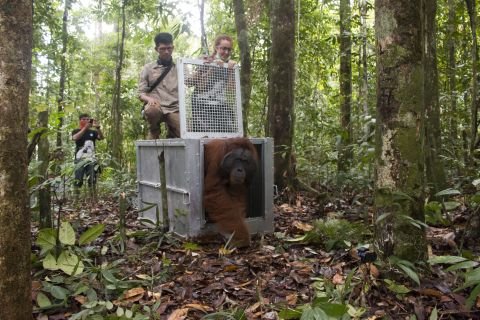
Three rescued orangutans have been released back into the rainforest of West Borneo by a team of conservationists. The release operation was carried out by our team in Indonesia, together with representatives from the local Forest Department (BKSDA Kalbar) and the Bukit Baka Bukit Raya National Park (BBBRNP.) The trio consisted of one wild male of more than 25 years old named Abun and two younger females. Our Human-Orangutan Conflict Response Team (HOCRT) had rescued Abun in August from a community garden in the hamlet of Kali Baru, Sungai Awan. He had been driven out of his home in Sungai Putri forest by land clearance operations and entered the community forest in search of food. After reports of several sightings of him in the garden, the team decided to remove the orangutan to prevent further damage to the plants and to protect him from angry local residents. Abun was caught and taken back to our orangutan centre in Ketapang where he remained in quarantine while preparations were made for the release operation.
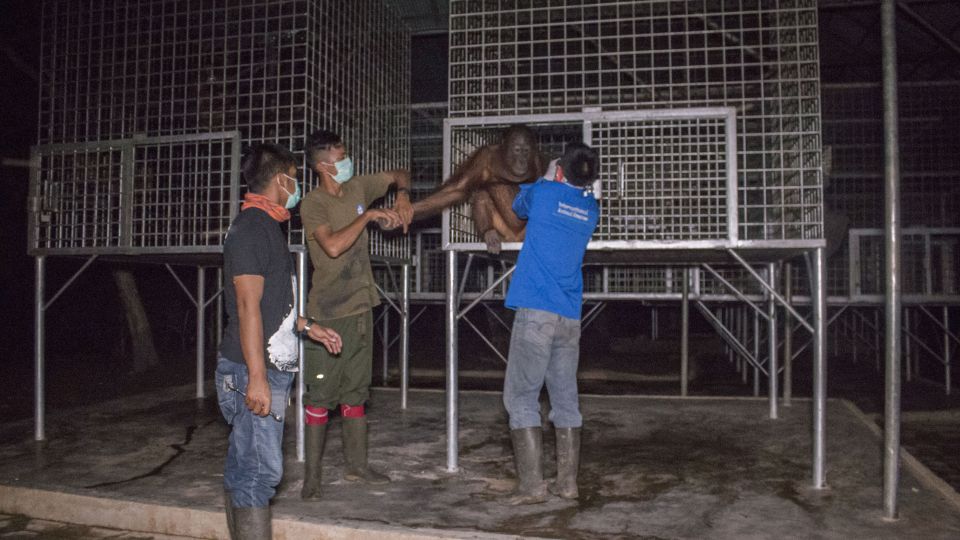
The two orangutans released with Abun were named Pinoh and Laksmi. Pinoh is a female of 13 years old. She had been kept as a pet in Nanga but was later surrendered to the local BKSDA in May 2011. Pinoh was then handed over to our centre in Ketapang for rehabilitation.
Female orangutan Laksmi was abandoned in a cage by someone fleeing from the police. The police officers took Laksmi to their office and then she too was passed on to our centre. She was three years old when she was rescued.
Before reintroduction Pinoh and Laksmi had to undergo a period of rehabilitation in “forest school” at our rehabilitation centre where they learnt to climb, forage for food, make a nest to sleep in at night and develop all the other behaviours they need to survive in the wild. Once they had mastered those skills, they were moved to “data island” – a pre-release island where our team gathers data on the orangutans’ behaviour to assess whether they are ready for release and equipped to fend for themselves back in the forest. “After a comprehensive rehabilitation process lasting six or seven years, we can ensure that orangutans like Laksmi and Pinoh are ready for reintroduction,” said Karmele L Sanchez, Programme Director of International Animal Rescue in Indonesia.
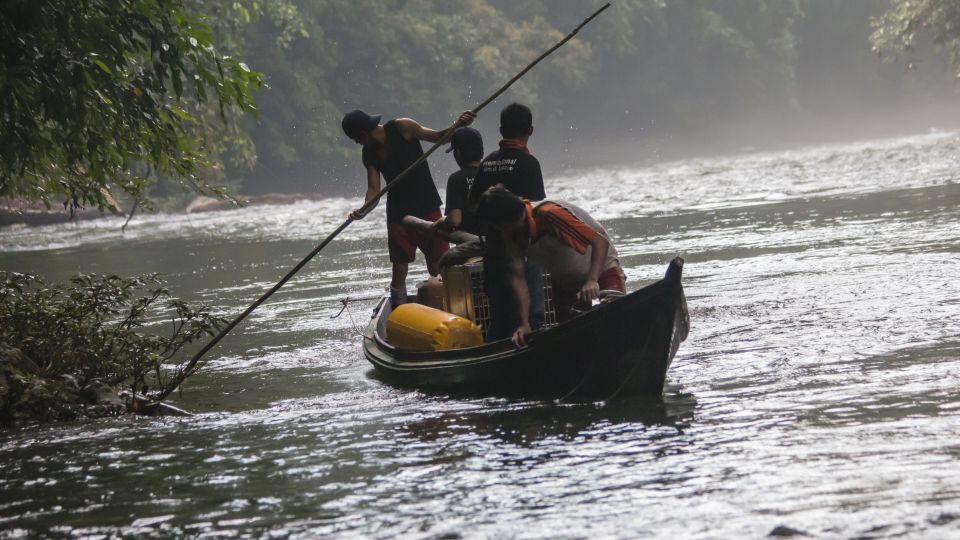
“In the wild infant orangutans stay with their mothers until they are at least seven years old and our rehabilitated orangutans need a similar time to become independent. She added: “It requires considerable resources and funds to rehabilitate and reintroduce orangutans into the wild. Moreover, once they have been returned to the forest the orangutans are monitored for two years or more to ensure they are thriving. Our medical team had already confirmed that the three orangutans were free from disease and in peak condition for returning to their natural habitat.
“The orangutans are all in good condition and Pinoh and Laksmi are displaying all the required natural behaviours,” said Dr Sulhi Aufa, IAR Indonesia’s Medical Coordinator.
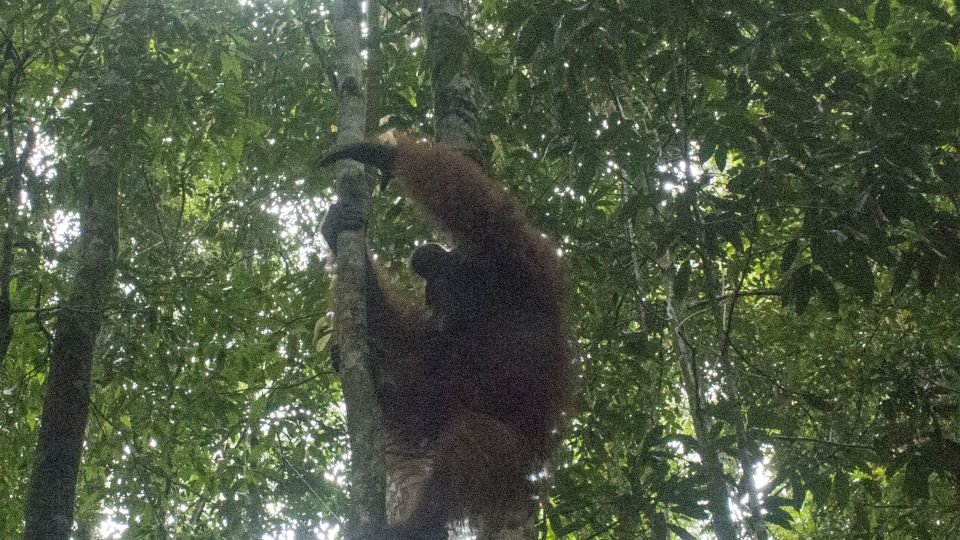
“We are confident they will be happy in their new home. “Abun is healthy and still has all his skills and wild behaviours to equip him for life in the forest. The release team set off from our rehabilitation centre in Ketapang on 10 September at 04.30 am. Of primary concern was to ensure that the orangutans weren’t unduly stressed during the journey which involved travelling by road, boat and then on foot to the release site in the national park.
Twelve porters from a nearby village carried the transport crates which, with the orangutans inside, weighed between 100kg and 150kg. “We are very grateful to the local villagers for helping us carry the cages to the release site,” said Karmele. “They have walked 9 kilometres up steep hillsides and across rivers carrying the very heavy cages. I don’t know what we would do without them!”
After travelling for a total of 57 hours, the team reached the site where Abun was to be released. The moment the door of his crate was lifted, he immediately climbed the tallest tree he could find and started eating. “The most uplifting thing is to see an orangutan returning to his natural habitat,” said Uray Iskandar from the BKSDA Kalbar. “The orangutan species is native to Indonesia and we must work to protect it and to protect its habitat.”
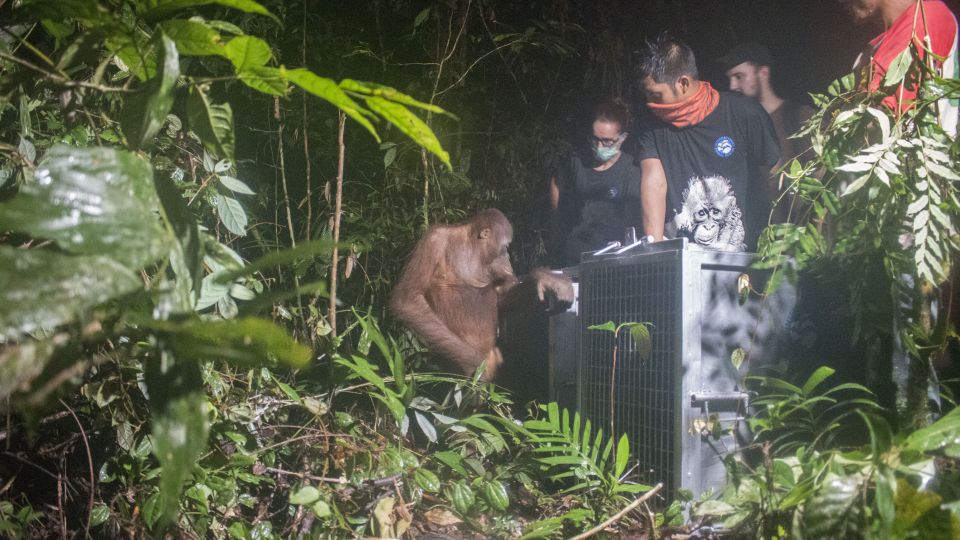
The release team then walked for a further five hours to the release site for Pinoh and Laksmi. By the time the pair was released their journey had lasted nearly three days and darkness was falling .Our monitoring teams will follow and observe the orangutans from the moment they get out of their nests in the morning until they settle down to sleep in the early evening. The monitoring is important to ensure the health and safety of the animals post-release.
Since 2015 our teams have released 17 orangutans in the National Park, of which nine were orangutans that had undergone rehabilitation and eight were wild orangutans being translocated. Abun was the fifth wild orangutan to be released in the Park in 2017. Bukit Baka Bukit Raya National Park has been chosen as a release site after a survey we carried out showed that it still contains plenty of forest, including an abundance of fruit trees for the orangutans to feed on.

